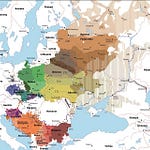In this episode of Unsupervised Learning Razib talks to Alex Nowrasteh, the director of economic and social policy studies at the Cato Institute. Alex is also the author of Wretched Refuse?: The Political Economy of Immigration and Institutions. His beat at Cato is immigration, and he has been keeping a close watch on the transition between the Biden and Trump administrations. The first issue Razib and Nowrasteh address is the reality that the COVID-19 pandemic resulted in a massive crash in immigration to the US due to Donald J. Trump’s executive orders. Curiously, Trump justified the border closures, not on public health grounds, but to safeguard American jobs. Additionally, Nowrasteh claims that Joe Biden’s administration has been “Trump’s second term” when it comes to immigration levels, as the migration rates have not reached the levels before the COVID-19 pandemic.
Though Democratic activists have argued for very liberal immigration policies, Nowrasteh observes that Biden’s 2020 campaign was only marginally more conservative. Contrary to expectations, immigration has been sidelined as a major issue despite Democrats controlling the Presidency and Congress. Nowrasteh asserts there has been “no interest in liberalizing immigration” within the administration, as they fear the political consequences.
Pivoting to the international stage, Razib wonders about the exodus of Ukrainians due to the Russian invasion. Nowrasteh commends European generosity in taking in refugees, but he believes that ultimately most of the migrants will remain in Europe due to simple economics. Ukraine was the poorest nation in Europe, and Razib and Nowrasteh wonder if a post-war Ukraine will be filled with the old, the very young and those with few prospects, as the productive working-age population permanently decamps to Western Europe.
Next, they discuss the global landscape of demographic transition and the reality that only Sub-Saharan Africa has high fertility rates. Nowrasteh observes that in fact, the Middle East might be the major destination for African migrants due to the collapsing population and the demand for workers in the region. Another obvious target to African migration will be Europe, but it is clear that the US is likely to be a destination when the immigration system relaxes and opens up.
Nowrasteh pivots back the US, and argues that despite all the rhetorical excesses that veer to open borders in the Democratic party, operationally the party hierarchy is much more conservative in terms of policy implementation. Razib points out that some elements of the Left associated with environmentalism, in particular the Sierra Club, have been associated with immigration restrictionism. Nowrasteh then observes that many conservative immigration restriction groups actually have pasts where they were founded by and associated with liberal population control environmentalists in the 1970’s. For example, the current website of the Federation for American Immigration Reform (FAIR) declares that “America’s immigration and border controls have fallen apart due to ineffective leadership from Washington. We face a true national emergency!” Paul Erhlich, Stanford ecologist and environmentalist author of the The Population Bomb (for which the first director of the Sierra Club wrote a foreword), was on the board of FAIR until the mid-2000’s.
They close the conversation by reflecting on the global “birth dearth” and the possibility of how many Americans there might be at the end of the 21st-century (sorry Matt Yglesias, a few fewer than 1 billion).












